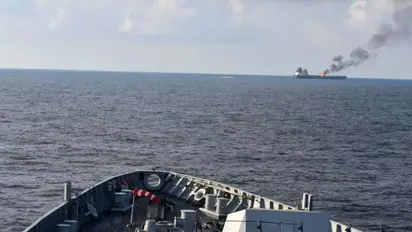British Rubymar vessel sinks completely in Red Sea days after Houthis’ attack (WATCH)

Synopsis
In a staggering turn of events, the British Rubymar ship has met its watery demise in the Red Sea, succumbing to the relentless aftermath of a recent attack by Yemen's Houthi rebels. The sinking unveils a new chapter in the escalating maritime tensions.
The Houthis have facilitated irreparable damages on another ship that has completely sunk into the Red Sea waters leaving no chance for retrieval. The Rubymar ship which was attacked on February 18 by the Houthis was travelling through the vital Bab al-Mandab strait that connects the Red Sea to the Gulf of Aden.
The Iran-backed terror group claimed responsibility for the attack on February 18 and also shared that the Rubymar ship had sunk completely. However, the ship was intact after the brutal attack causing major damage. Britain was planning to tow the vessel to a nearby port.
However, due to adverse weather conditions in the Red Sea, the Rubymar ship was sunk completely causing astronomical damages to the parent company. The vessel at the time of reporting the story is still showing signals on the ship tracker. Moreover, various small vessels have surrounded the drowning Rubymar.
This is the first case of complete drowning of a vessel after a Houthis attack. The route which is vital for global trade and energy trade has been witnessing underwhelming traffic due to the terror group's presence in the Red Sea. This has resulted in the diversion of maritime routes to a much lengthier distance.
The crisis in the Red Sea region has already resulted in the driving up of global oil prices. The case of the Rubymar ship will add further scare in the aspect of maritime security driving up the prices of insurance for vessels. All the effects due to the presence of the Houthis group will further drive up global inflation causing the price of commodities.
Check the Breaking News Today and Latest News from across India and around the world. Stay updated with the latest World News and global developments from politics to economy and current affairs. Get in-depth coverage of China News, Europe News, Pakistan News, and South Asia News, along with top headlines from the UK and US. Follow expert analysis, international trends, and breaking updates from around the globe. Download the Asianet News Official App from the Android Play Store and iPhone App Store for accurate and timely news updates anytime, anywhere.